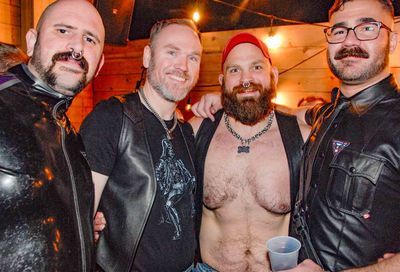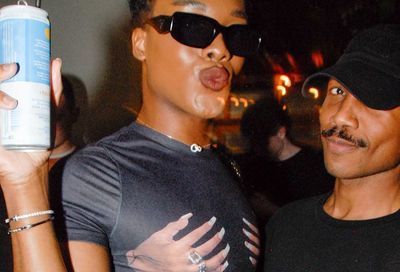Schism Schematic
A Town Square Opinion
After last week’s General Convention of The Episcopal Church, held in Columbus, Ohio, gay attendees and their allies were taking a while to absorb its meaning. As friends of mine on the scene noted, the worst did not happen. No resolution was adopted expressing regret or apology for the election of Gene Robinson as a bishop in 2003. Nor was a resolution adopted halting the development of rites for same-sex unions. Also, gay-supportive Bishop Katharine Jefferts Schori of Nevada was elected the first woman presiding bishop.
On the other hand, the day after the Convention voted to reject the anti-gay Windsor Report, bishops (with help from Jefferts Schori, and using what many have called heavy-handed tactics) pushed through a resolution ”to engage in a process of healing and reconciliation,” and to ”call upon Standing Committees and bishops with jurisdiction to exercise restraint by not consenting to the consecration of any candidate to the episcopate whose manner of life presents a challenge to the wider church and will lead to further strains on communion.”
Bishop Robinson writes, ”The scene of gay and lesbian deputies, willing to fall on their own swords for the presumed good of the Church, voting for this resolution against their own self-interest was an act of self-sacrifice that I won’t soon forget.
”Keeping us in conversation with the Anglican Communion was the goal — for which the price was declaring gay and lesbian people unfit material for the episcopate. Only time will tell whether or not even that was accomplished. Within minutes — yes, MINUTES – the conservatives both within our Church and in Africa declared our sacrificial action woefully inadequate. It felt like a kick in the teeth….”
The Anglican Primate of Nigeria, Peter Akinola, a leader of the right-wing forces, concluded a June 23 open letter to the Episcopal Church USA with this: ”We assure all those Scripturally faithful dioceses and congregations alienated and marginalised within your Provincial structure that we have heard their cries.”
That’s like a guy confiding in you that he intends to marry your wife after she divorces you. Akinola seeks reconciliation the way a predator does with its prey. This is not about theology, it is about power, and gay issues are merely a pretext for the power grab.
These are the makings of a schism. The Western branches of the Communion can hardly allow themselves to be overrun by medieval obscurantism in the name of unity. As Akinola himself stated after the destruction of Christian churches in northern Nigeria by Islamist thugs, ”From all indications, it is very clear now that the sacrifices of the Christians in this country for peaceful co-existence with people of other faiths has [sic] been sadly misunderstood to be weakness.”
How right you are, Eminence. The impulse toward compromise on the part of tolerant progressives is exploited by intolerant conservatives who have no interest in compromise. There is no reason why continuing a conversation should require unilateral concessions. The appeasement in Columbus was reminiscent of the signing of the Munich Agreement by Neville Chamberlain in 1938. The difference in this case is that the appeased aggressor won’t bother to sign a phony peace agreement.
Colin Slee, the Dean of Southwark Cathedral, contrasts Akinola’s obsession over homosexuality with his church’s relative silence regarding Nigeria’s ”massive abuse of women, polygamy, female mutilation and stoning for adultery.” In the Gospel of John, of course, when the scribes and Pharisees cite Mosaic law calling for an adulterous woman to be stoned, Jesus replies, ”Let the one who has not sinned cast the first stone.” But Akinola is far more in sympathy with the Pharisees.
The current acrimony’s roots lie in the 1998 Lambeth Conference, which, as retired Bishop John Shelby Spong writes, ”was overwhelmed by a homophobic combination of first world Anglican evangelicals with third world Bible quoting Anglican fundamentalists.”
More recently, the Windsor Commission called for the 38 national branches of the Anglican Communion to endorse ”current Anglican teaching.” To the contrary, Spong notes that the Anglican Church ”has never recognized an infallible pope or an inerrant Bible,” and asks, ”Would those Anglicans who have engaged critical biblical scholarship be asked to subscribe to the pre-modern mindset of some third world countries that oppose evolution, interpret the Virgin Birth as literal biology or view the Resurrection as a physical resuscitation?”
The problem is not disunity, but dogmatism. Some people are convinced that they have a lock on divine truth, and that it lies in a literal-minded reading of the Bible. This does not resemble Anglicanism. Others, who value the past two centuries of biblical scholarship as well as extra-Biblical sources such as the reality of God’s creation, recognize that as mortals we can never possess the knowledge of God, but can only seek greater understanding. As Bishop Spong observes, ”Whenever growth occurs there is always conflict and dislocation.” This happened previously over the issue of women bishops. Quite simply, the children of the Enlightenment have to stand and fight for it.
The prophet Ezekiel spoke against false prophets: ”They have misled my people by saying ‘Peace!’ when there is no peace. Instead of my people rebuilding the wall, these men come and slap on plaster. Tell these plasterers: It will rain hard, it will hail, it will blow a gale, and down will come the wall.”
Let it come down.
Richard J. Rosendall is a writer and activist whose work has appeared on Salon.com and the Independent Gay Forum (www.indegayforum.org). He can be reached at rrosendall@starpower.net.
Support Metro Weekly’s Journalism
These are challenging times for news organizations. And yet it’s crucial we stay active and provide vital resources and information to both our local readers and the world. So won’t you please take a moment and consider supporting Metro Weekly with a membership? For as little as $5 a month, you can help ensure Metro Weekly magazine and MetroWeekly.com remain free, viable resources as we provide the best, most diverse, culturally-resonant LGBTQ coverage in both the D.C. region and around the world. Memberships come with exclusive perks and discounts, your own personal digital delivery of each week’s magazine (and an archive), access to our Member's Lounge when it launches this fall, and exclusive members-only items like Metro Weekly Membership Mugs and Tote Bags! Check out all our membership levels here and please join us today!






















